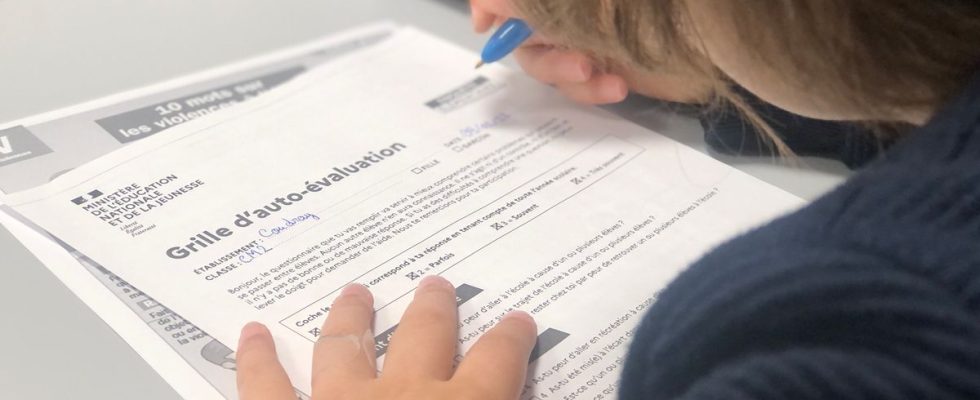“Oh, but the questions are weird,” chuckles a boy. At the Coudray primary school in Nantes, a rather special sheet has just been distributed to the 24 CM2 students this Thursday morning. Firstly, because it is not a test, but also because you should not write your name on it. Plus, there’s no right or wrong answer, and you don’t even have to… “Come on, who reads the first question out loud?” », asks the teacher. Several fingers are already raised. “Are you afraid of going to school because of one or more students? », articulates a small voice.
Addressed to all students in France from CE2 onwards, an anonymous self-assessment questionnaire on school bullying is arriving this year in schools, middle and high schools, starting this Thursday. A way to “take the temperature”, to “detect the phenomenon, contain it if necessary, and mobilize collectively”, explains Dominique Malroux, academic director of the National Education Services of Loire-Atlantique, who made the trip on the occasion of the day to combat school bullying, the government’s stated “priority”.
“What could it be, getting bothered in the toilet? »
Even if the thirty questions, written by child psychiatrists, has been adapted for each age group, it’s not easy to understand and talk about all that when you’re 9 years old. But the students, motivated, keep up. “Aggressive, does everyone know what that means? », questions the teacher, who takes the opportunity to review the notion of synonym. “What could it be, getting bothered in the toilet? », she also asks, in reference to another question. “It’s when someone bangs hard on the door, or tries to open it while we’re there,” a little girl responds immediately.
“Have you ever been given a mean nickname?” “, “Have you ever been left out at recess? », “Do you have a stomach ache or a headache because of what you are experiencing at school? »… All potential situations of harassment at home, at school, or on the Internet are listed. The notion of consent is also discussed. An additional tool to “free speech” in this class where these children, who already seem rather comfortable expressing themselves on the subject out loud, can wonder for a few moments about their personal situation. “If we’re a little scared, what do we check? », asks a little girl, who hesitates in front of this grid which goes from 1 (never) to 4 (very often).
“Victims can murder themselves!” »
At the start of the session, a comic strip and a list of vocabulary words were enough to start the debate. “Being bullied is when you are bothered for a long time and it never stops,” says a little girl. If we don’t talk about it, we’ll be alone and even sadder. » “Besides, the victims can murder themselves!” », says one of his comrades, who obviously wanted to talk about the thorny notion of suicide. “It’s a bit like depression,” replies another. When you say to yourself, “what’s the point of living?” »
While the government asked that two hours be made commonplace in each class for this awareness, the CM2s of Coudray then seemed delighted to “mistreat apples”. Objective: to better understand the notion of after-effects, these traces which can appear or grow after receiving blows. The teachers will have to dissect the students’ responses according to a methodology “yet to be defined”… even if we already know that the anonymous nature will not make it possible to detect particular situations.
“It’s not the objective, it’s a revealer,” explains Dominique Malroux. And for some students, this may be a first step. » The ministry, which will collect some of the responses, hopes for its part to obtain “a clearer and more updated vision of the phenomenon of harassment at the national level”. The questionnaires will be distributed to all French establishments by Wednesday November 15.

